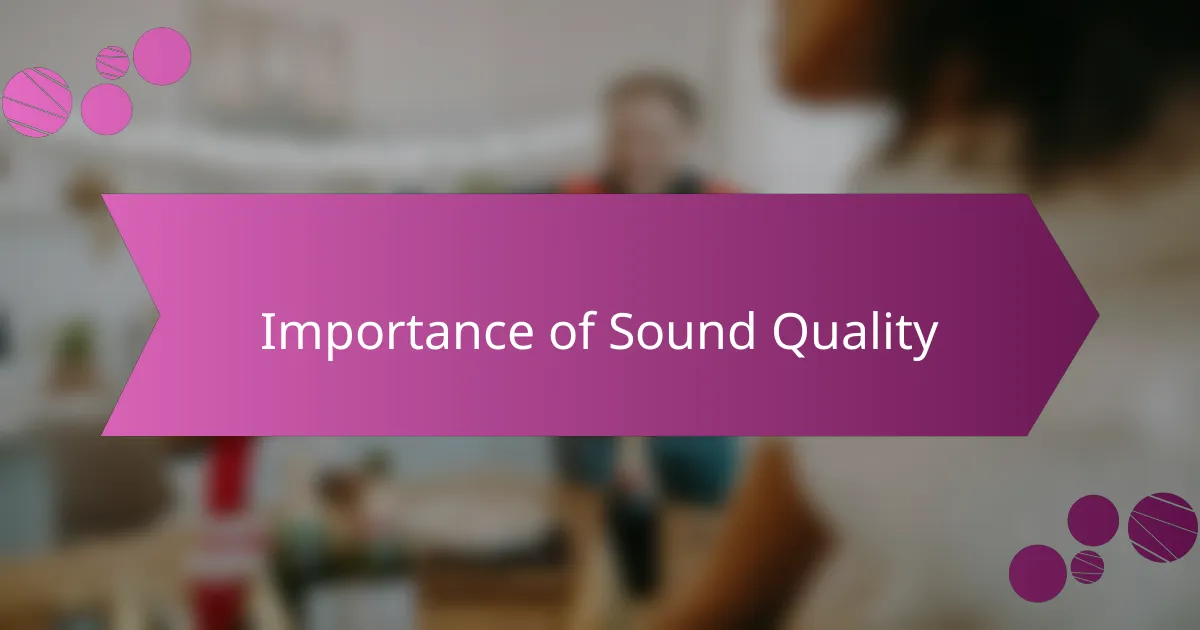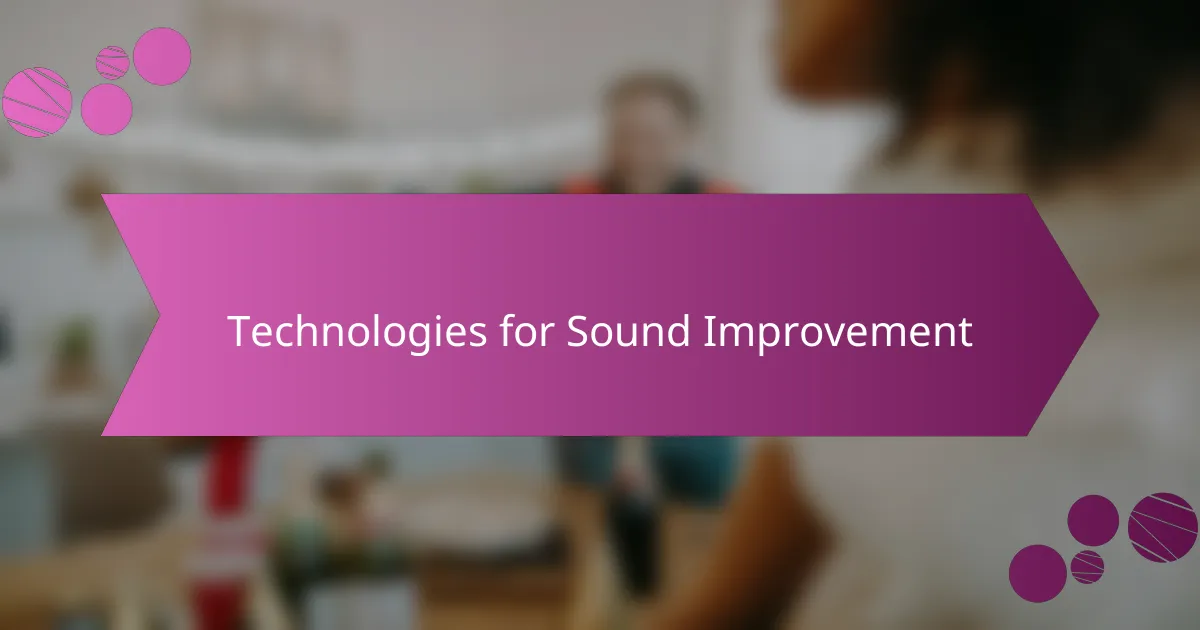Key takeaways
- Thai music festivals provide immersive experiences that celebrate the rich cultural heritage of Thailand through music, food, and art.
- Sound quality significantly impacts the overall enjoyment of live performances, with clear audio enhancing audience engagement and emotional connection.
- Key factors for improving sound quality include speaker placement, high-quality audio equipment, and effective sound checks to optimize performance experiences.
- Advancements in technology, like digital signal processors and line-array speakers, contribute to clearer, richer sound at festivals, greatly enhancing the atmosphere.

Overview of Thai Music Festivals
Thai music festivals are vibrant celebrations that showcase the rich cultural heritage of Thailand. They’re not just events; they’re immersive experiences that bring communities together through the universal language of music. I remember attending the Songkran Music Festival, feeling the sheer energy of the crowd as they danced to a mix of traditional and contemporary Thai tunes. Can you picture the excitement of live performances under the sun, surrounded by friends and strangers alike?
The festivals vary significantly in style and focus, ranging from traditional folk music to modern pop and rock influences. Each festival offers something unique, beautifully reflecting the diverse musical landscape of Thailand. During the Chiang Mai Jazz Festival, I was struck by how different genres could blend, creating a warm atmosphere that felt both familiar and exhilarating. What is it about live music that connects us so deeply, regardless of our backgrounds?
In addition to music, these festivals also celebrate local culture through food, art, and dance, making them a feast for the senses. I often find myself exploring local stalls, discovering flavors and dishes I’ve never tried before. Isn’t it amazing how these festivals allow us to indulge in not just sound, but in taste and visual artistry as well? They truly encapsulate what it means to experience Thai culture in all its glory.

Importance of Sound Quality
Sound quality is paramount at any music festival, especially in a lively setting like those in Thailand. I can recall a moment at a local festival when the bass thumped perfectly in sync with the rhythm, creating an electric atmosphere that pulled everyone onto the dance floor. Isn’t it incredible how crisp sound can elevate an entire performance, making it unforgettable?
When the sound is clear and well-balanced, it transforms a simple performance into a mesmerizing experience. I’ve often noticed that audiences are more engaged when they can hear each note distinctly. Doesn’t it make you feel more connected to the artists and the emotions they’re conveying? It’s this connection that makes live music so special.
Additionally, poor sound quality can detract from the overall enjoyment, leading to frustration among listeners. I remember attending a show where the audio was muffled, and it felt like something was missing. It really underscored for me how much good sound contributes to the magic of a live performance. What’s a festival without that immersive auditory experience?

Key Factors in Sound Quality
When I think about sound quality, especially in the vibrant atmosphere of a Thai music festival, several key factors come to mind. The placement of speakers can truly elevate the experience, almost like the difference between a casual conversation and a heartfelt song. I remember attending a festival where the sound was perfectly balanced; it felt like the music wrapped around me, creating a connection that made every note resonate emotionally.
Another essential element is the type of audio equipment used. High-quality microphones and mixers not only capture the artist’s intent but enhance the audience’s experience, creating a memorable atmosphere. I find that when the sound is crisp and clear, it enhances my enjoyment, making me feel more present and engaged during performances.
- Speaker placement and direction
- Quality of microphones and mixers
- Acoustic environment of the venue
- Volume control and balance
- Use of soundproofing materials in the setup

Technologies for Sound Improvement
When it comes to enhancing sound quality at a music festival, technology plays a pivotal role. I’ve attended several festivals, and I must say, experiencing clear, crisp audio can elevate the entire atmosphere. For example, advancements like digital signal processors (DSPs) and high-fidelity speakers have made a noticeable difference in how sound is experienced live. These technologies not only reduce distortion but also enhance the depth of the music, allowing every note to resonate beautifully.
I remember one festival where they employed an array of line-array systems, and the sound coverage was even across the field. Audience members were delighted, dancing freely without the distraction of muddy audio. It made me appreciate how much thought goes into sound engineering at these events.
Here’s a comparison table highlighting some key technologies for sound improvement:
| Technology | Description |
|---|---|
| Digital Signal Processors (DSP) | Enhances audio signals for clarity and depth. |
| Line-Array Speakers | Provides consistent sound distribution over large areas. |
| Subwoofer Arrays | Improves bass response and overall sound richness. |

Personal Experiences with Thai Festivals
Attending Thai music festivals has been a truly transformative experience for me. The vibrant atmosphere, combined with the rich soundscapes, allows me to connect deeply with the artists and the culture. I remember the first time I heard traditional Thai instruments like the khim and ranat ek live; it was as if the music wrapped around me, stirring emotions I didn’t know I had.
Over the years, I’ve witnessed incredible improvements in sound quality at these festivals. Each event seems to raise the bar, offering clearer vocals and richer instrumentals that enhance the overall experience. The joy of feeling the bass through the crowd and hearing every nuanced note is hard to put into words but makes every moment unforgettable.
- Enhanced audio systems that capture the essence of live performances.
- Use of better acoustics in outdoor venues to reduce echo.
- Increased awareness among organizers about the importance of sound quality.
- Artists engaging more with sound engineers to deliver their best sound.
- Innovative setups that balance traditional music with modern sound techniques.

Recommendations for Better Sound Quality
When it comes to improving sound quality at a Thai music festival, I recommend investing in high-quality audio equipment. From my experience, superior speakers and microphones can significantly enhance the listening experience, making every note and lyric resonate beautifully. I’ve noticed that when the sound is crisp, it creates an unforgettable atmosphere that lets everyone fully connect with the music.
Additionally, proper placement of speakers can make all the difference. I remember attending a festival where the speakers were strategically positioned, allowing the sound to flow seamlessly through the crowd. It felt as if the music enveloped us, creating a magical bond among festival-goers.
Lastly, don’t underestimate the value of sound checks. I often found that festivals that took the time for thorough sound checks had noticeably better sound quality. It’s a small investment of time that pays off in spades, elevating the entire event for both artists and audience alike.
| Recommendation | Explanation |
|---|---|
| High-Quality Equipment | Using superior speakers and microphones enhances sound clarity and richness. |
| Speaker Placement | Strategically positioned speakers ensure even sound distribution throughout the audience. |
| Thorough Sound Checks | Regular sound checks before performances help optimize audio quality. |



